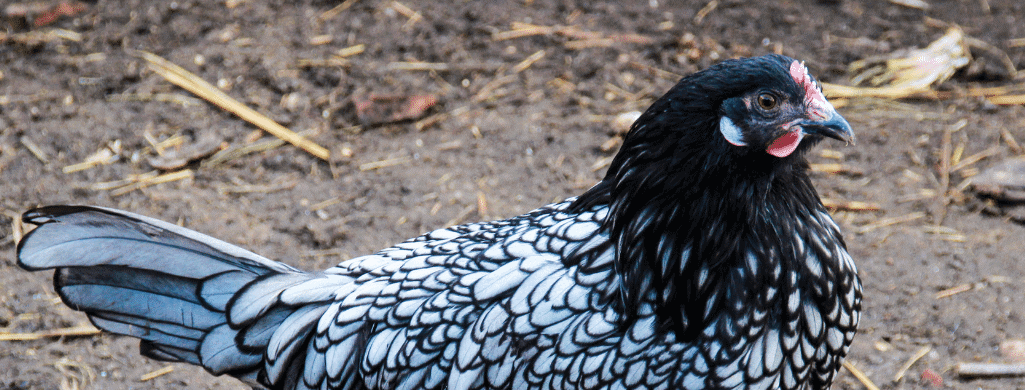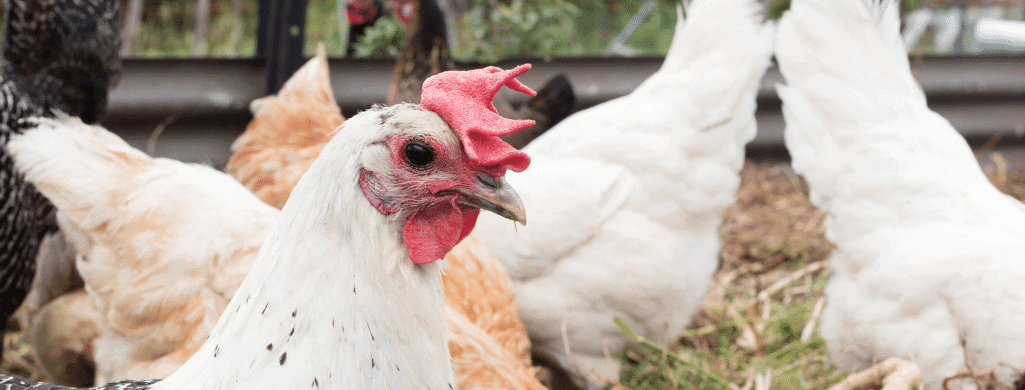Ancona chickens are a popular Mediterranean breed many backyard chicken keepers want in their flock.
Yet, if you keep breeds of chickens for egg production, a tendency to brood can really get in the way! So, are Ancona chickens broody?
Ancona chickens aren’t prone to going broody. This breed of chicken was bred to lay eggs, and broodiness slows down this process. As such, the dual-purpose birds were selectively bred to lessen brooding behavior in the chickens, and modern Anconas don’t have much interest in hatching a clutch.
Of course, there’s much more to this topic than this simple answer.
Look ahead for the details and advice on managing your Ancona hens.

Table of Contents
ToggleAre Ancona Chickens Good Egg Layers?
Alongside their striking mottled or black feathers, Ancona chickens are often associated with their incredibly productive work as prolific layers.
Their lack of broodiness has helped the Mediterranean breed become exceptional egg layers. This is because it means there are fewer breaks in their laying cycle.
What Are Signs of Broodiness?
Broodiness is a trait in chickens marked by a few notable signs. These are some of the signs to watch out for, no matter the breeds of chickens in question.
The Chickens Stick to the Coop
One of the first things you’ll notice is your hen sticking to her nest. Hens tend to stick close to incubate their eggs.
Yet, even nesting hens will occasionally step away from the nest to take care of their basic needs. Still, they won’t wander far from the chicken coop.
Hens Start Plucking Their Own Feathers
You may also notice your hen pulling at her own feathers.
When they do this, they usually pull at their breast feathers. To avoid any real damage, you’ll want to curb this behavior as soon as possible.
A Change in Chicken Temperament
Another thing backyard chicken keepers notice in their broody chickens is more aggressive behavior. This includes increased aggression towards other chickens and the chicken enthusiast caring for them.
This might mean when you go to collect their eggs, your Ancona chicken pecks at you or acts more aggressively than normal. Even a lap chicken may turn aggressive when brooding.
Chickens may increase their aggression towards other chickens in the flock too. While brooding, you might see them peck at their friends if they approach their nest.

How Do You Break a Broody Chicken?
Broody behavior often proves problematic. While it’s possible to wait it out, this takes a lot of time and attentive care. There are a few other options to help speed the process along.
On the off chance your Ancona becomes broody, there are a few methods to break the spell.
Remove the Chicken from Her Flock
A new environment has the potential to break a broody period.
In chicken keeping, you often want to keep the flock together. Chickens aren’t often interested in spending time alone.
They thrive better when they’re a part of a flock.
Yet, when broodiness sets in, give the Ancona chicken her own space for a few days. This should still meet all of her needs but give her some space.
In most cases, this method works quickly. While it can vary from chicken to chicken, the average wait is about three days for this treatment.
Cool the Underside of Your Chicken
A little bit of ice is another easy way to break broodiness in chickens. There are a few ways to achieve this.
First, one option is to cool the nest. One way to do this is to open the bottom of the nest with mesh. This will allow additional airflow.
Another faster option is to add an ice pack to the nest.
For another option, dampen the bottom of your chicken. She’s more apt to stay active to dry off after this.
Give the Chicken Some Fertilized Eggs
If you’d like to hatch a clutch, it’s possible to face the desire your chicken is expressing head-on.
Yet, if there’s no rooster, your chickens aren’t going to lay fertilized eggs. In this case, it helps to give them fertilized eggs to sit on.
From here, the chickens will brood on the eggs until they’re ready to hatch. Then, she’ll take care of the baby chicks until they’re ready to stand independently.
Are Anconas Good Mothers?
Anconas aren’t great mothers for a couple of reasons.
First, they’re bred to lay eggs, not hatch chicks. As such, they haven’t retained a lot of their brooding behavior.
In addition, this is a frequent-roaming, active forager breed. The hens aren’t often interested in staying in one place.
This means sitting on a nest to incubate eggs isn’t high on their list of priorities.
If you’re interested in hatching a clutch of chicks, broody chicken breeds other than an Ancona chicken may better serve this role in the flock.
How Many Eggs Does an Ancona Chicken Lay?
According to The Livestock Conservancy, the Ancona chicken breed lays about 220 eggs yearly. This means they lay about four to six eggs every week.
With a large egg size, this is phenomenal egg production.
This is an average too, so you may see even more eggs from your Ancona flock!
At What Age Do Ancona Chickens Start Laying Eggs?
Once these chatty chickens hatch, you only have to wait about five months before the females of the breed start to lay their first eggs.
This is about average for chickens as a species.
Are Ancona Chickens Cold Hardy?
Another benefit of this nearly brood-free breed type is its resilience in cold and warmer climates.
In most cases, it’s reasonable to expect egg production to continue all year round for these dual-purpose chickens.
This makes an Ancona flock even more productive. The hardy breed produces year-round and doesn’t often require you to break periods of brooding often.
Still, it’s important to pay special attention to chicken health in the winter. While excellent winter layers, they’re still vulnerable to comb and wattle frostbite.
Comb type has an impact on this. Rose comb varieties have an easier time warding off frostbite than single-comb Ancona chickens. Both are prone to wattle frostbite if you don’t
Ancona Chicken: Not a Broody Breed
Broodiness in an Ancona chicken can cause real problems if you aren’t aiming to hatch a clutch.
The good news is backyard flocks of these adaptable birds aren’t prone to brooding.
While it can happen occasionally, the desire to brood has largely been bred out of this breed of chicken to increase egg production.
In other words, this is a great breed to keep if you value egg production but not if you’re looking to hatch chicks.
How useful was this post?
Click on a star to rate it!
We are sorry that this post was not useful for you!
Let us improve this post!
Tell us how we can improve this post?
